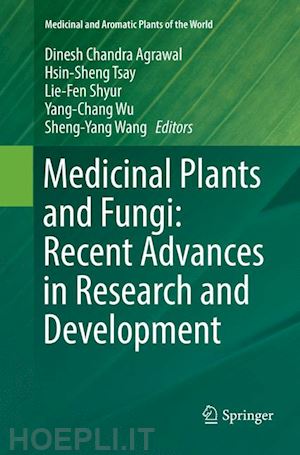
Questo prodotto usufruisce delle SPEDIZIONI GRATIS
selezionando l'opzione Corriere Veloce in fase di ordine.
Pagabile anche con Carta della cultura giovani e del merito, 18App Bonus Cultura e Carta del Docente
This book highlights the latest international research on different aspects of medicinal plants and fungi. Studies over the last decade have demonstrated that bioactive compounds isolated from medicinal fungi have promising antitumor, cardiovascular, immunomodulatory, anti-allergic, anti-diabetic, and hepatoprotective properties. In the light of these studies, the book includes chapters (mostly review articles) by eminent researchers from twelve countries across the globe working in different disciplines of medicinal plants and fungi. It discusses topics such as the prevention of major neurodegenerative and neurotoxic mechanisms by Centella asiatica; the medicinal properties and therapeutic applications of several mushrooms species found in different parts of the world; and fungal endophytes as a source of bioactive metabolites including anticancer and cardioprotective agents. There are also chapters on strategies for identifying bioactive secondary metabolitesof fungal origin; the use of genomic information to explore the biotechnological potential of medicinal mushrooms; and solid state fermentation of agro-industrial and forestry residues for the production of medicinal mushrooms.
It is a valuable resource for the researchers, professionals and students working in the area of medicinal plants and fungi.
Part 1. Medicinal Properties / Therapeutic Effects - Medicinal Plants and Fungi.- Chapter 1. Centella asiatica, an Ayurvedic Medicinal Plant, Prevents the Major Neurodegenerative and Neurotoxic Mechanisms Associated with Cognitive Impairment.- Chapter 2. Medicinal properties of Mediterranean Oyster mushrooms, species of genus Pleurotus (higher Basidiomycetes).- Chapter 3. Cordyceps – A Highly Coveted Medicinal Mushroom.- Chapter 4. Medicinal Mushrooms with Antiallergic Activities.- Chapter 5. The Bioactivity of Tiger Milk Mushroom - Malaysia's Prized Medicinal Mushroom.- Chapter 6. Antioxidant Properties of Antrodia cinnamomea – An Extremely Rare and Coveted Medicinal Mushroom Endemic to Taiwan.- Part 2. Bioactive Compounds – Medicinal Plants and Fungal Endophytes.- Chapter 7. The Fungal Endobiome of Medicinal Plants: A Prospective Source of Bioactive Metabolites.- Chapter 8. Multipotent and Poly-Therapeutic Fungal Alkaloids of Claviceps purpurea.- Chapter 9. Recent Advance On Bioactive Compounds From The Edible And Medicinal fungi in China.- Chapter 10. Endophytes From Malaysian Medicinal Plants As Sources For Discovering Anticancer Agents.- Chapter 11. Mushrooms: A Pandora Box of Cardioprotective Phytochemicals.- Part 3. Production Systems and Biotechnology - Medicinal Plants and Fungi.- Chapter 12. Solid State Fermentation Of Plant Residues And Agro-Industrial Wastes For The Production Of Medicinal Mushrooms.- Chapter 13. Making Use of Genomic Information to Explore the Biotechnological Potential of Medicinal Mushrooms.- Chapter 14. Biotechnology of Medicinal Plants and Fungi in Taiwan –Production of Bioactive Secondary Metabolites in In Vitro Culture Systems.- Part 4. Resources / Techniques – Medicinal Plants and Fungi.- Chapter 15. Memory Enhancing and Related Beneficial Effects of Selected Medicinal Plants From the Nigerian Flora.- Chapter 16. Identification Strategies For Bioactive Secondary Metabolites Of Fungal Origin.
Professor/Dr. Dinesh Chandra Agrawal has more than 35 years of research experience in plant biotechnology of diverse plant species including medicinal plants and fungi. Currently, he is a Professor at the Department of Applied Chemistry, Chaoyang University of Technology, Taiwan. Before it, he served as a Chief Scientist & Professor of Biological Sciences in the CSIR-National Chemical Laboratory (NCL), Pune, India. A recipient of several prestigious awards and fellowships including the Alexander von Humboldt Fellow (Germany), Prof. Agrawal, has worked in the USA, UK, and Germany. He has 160+ publications including three books to his credit. Presently, he is serving as an Associate editor-in-chief of the ‘International Journal of Applied Science and Engineering’ (Scopus).
Professor/Dr. Hsin-Sheng Tsay has more than 40 years of research experience and made a significant contribution towards the biotechnology of medicinal plants in Taiwan. At the Chaoyang University of Technology, Taiwan, he had served as a chair professor, Department of Applied Chemistry; Dean, College of Science and Engineering; and Director and chair professor of the Graduate Institute of Biotechnology. During his career, Prof. Tsay has won several national and international awards and has 265+ publications to his credit.
Professor/Dr. Lie-Fen Shyur is a Research Fellow at the Agricultural Biotechnology Research Center, Academia Sinica, Taiwan. She holds adjunct or joint professorships at six academic institutions in Taiwan. Dr. Shyur has served on several journal editorial board members, published more than 90 high profile research articles and reviews, and obtained more than 25 international patents and two national awards. The chief goal of Dr. Shyur’s research is to develop agricultural or plant-derived agents for human or animal health-care or bio-industrial usages.
Professor/Dr. Yang-Chang Wu is presently working as a chair professor of the Graduate Institute of Natural Products, and Director of the Research Center for Natural Products and Drug Development, Kaohsiung Medical University, Taiwan. Before it, he had served as a chair professor and dean of the School of Pharmacy, and vice-president of the China Medical University, Taiwan. Prof. Wu has 556+ research articles in SCI journals and 40+ patents to his credit.
Professor/Dr. Sheng-Yang Wang is a distinguished professor at the Department of Forestry, National Chung Hsing University, Taiwan. He is one of the well-known phytochemists in Taiwan. He has expertise in the qualitative and quantitative determination of natural products by chromatography and spectroscopy. Prof. Wang obtained several important scientific awards in his career and has published 140+ scientific articles.











Il sito utilizza cookie ed altri strumenti di tracciamento che raccolgono informazioni dal dispositivo dell’utente. Oltre ai cookie tecnici ed analitici aggregati, strettamente necessari per il funzionamento di questo sito web, previo consenso dell’utente possono essere installati cookie di profilazione e marketing e cookie dei social media. Cliccando su “Accetto tutti i cookie” saranno attivate tutte le categorie di cookie. Per accettare solo deterninate categorie di cookie, cliccare invece su “Impostazioni cookie”. Chiudendo il banner o continuando a navigare saranno installati solo cookie tecnici. Per maggiori dettagli, consultare la Cookie Policy.